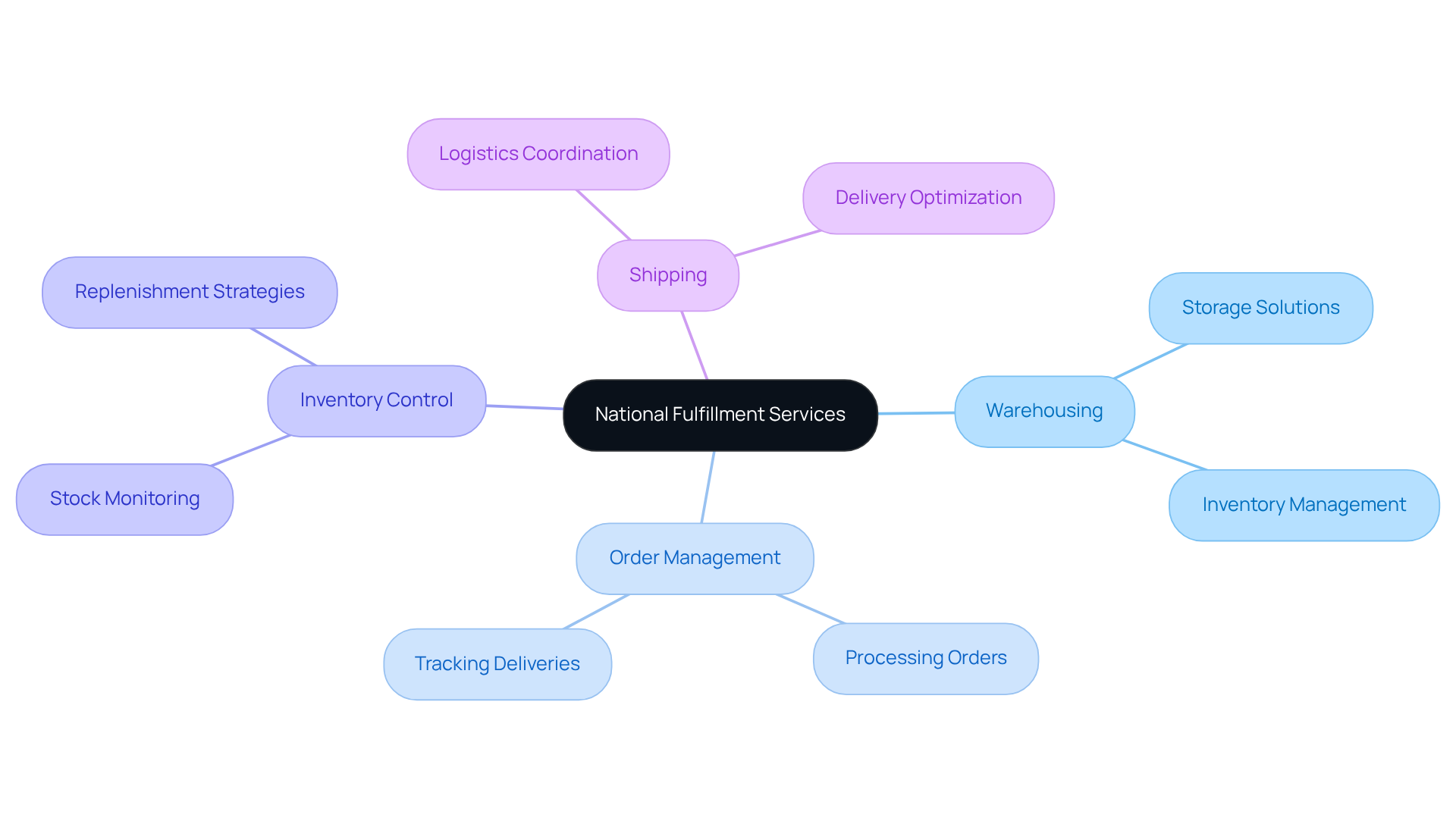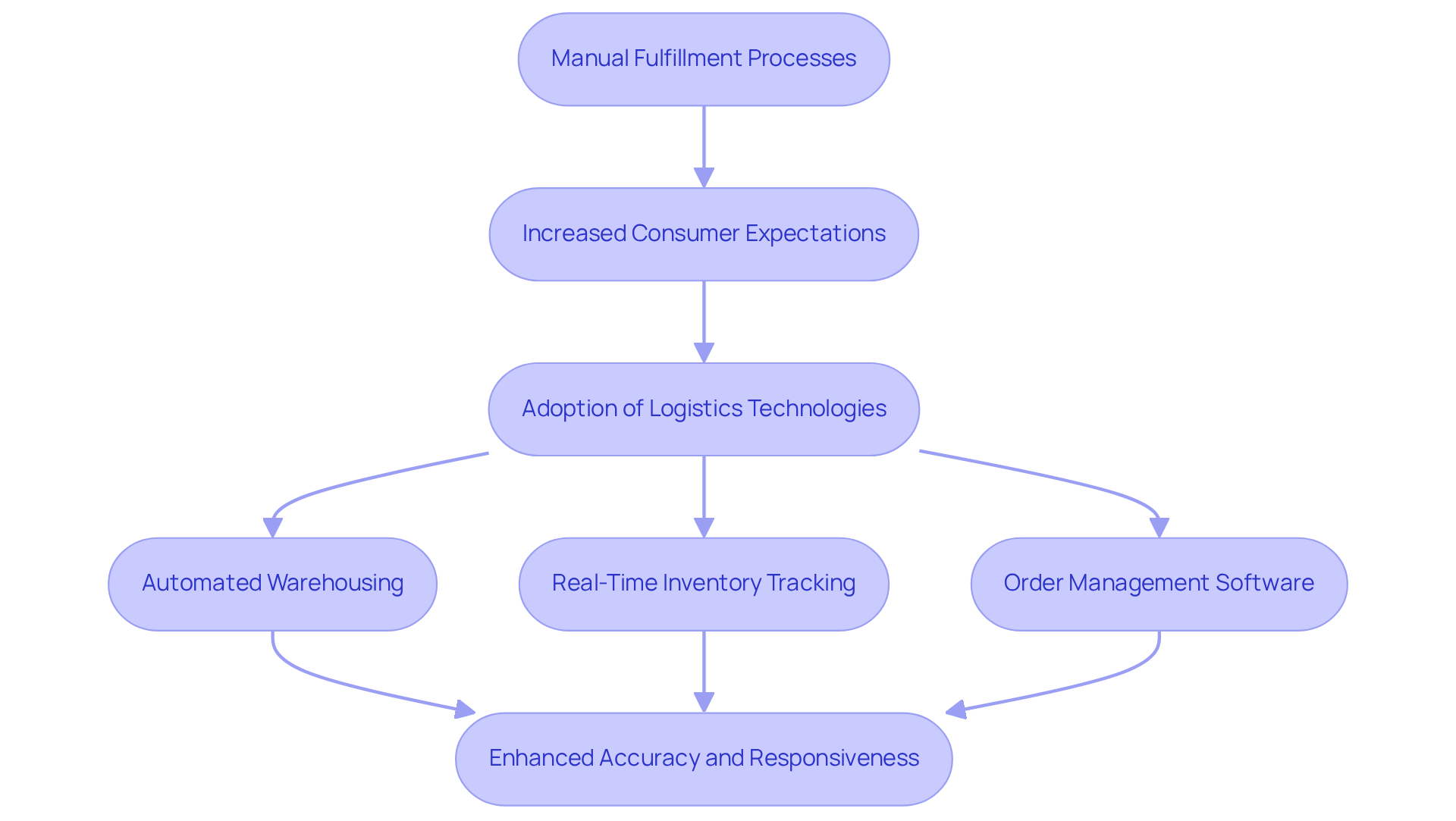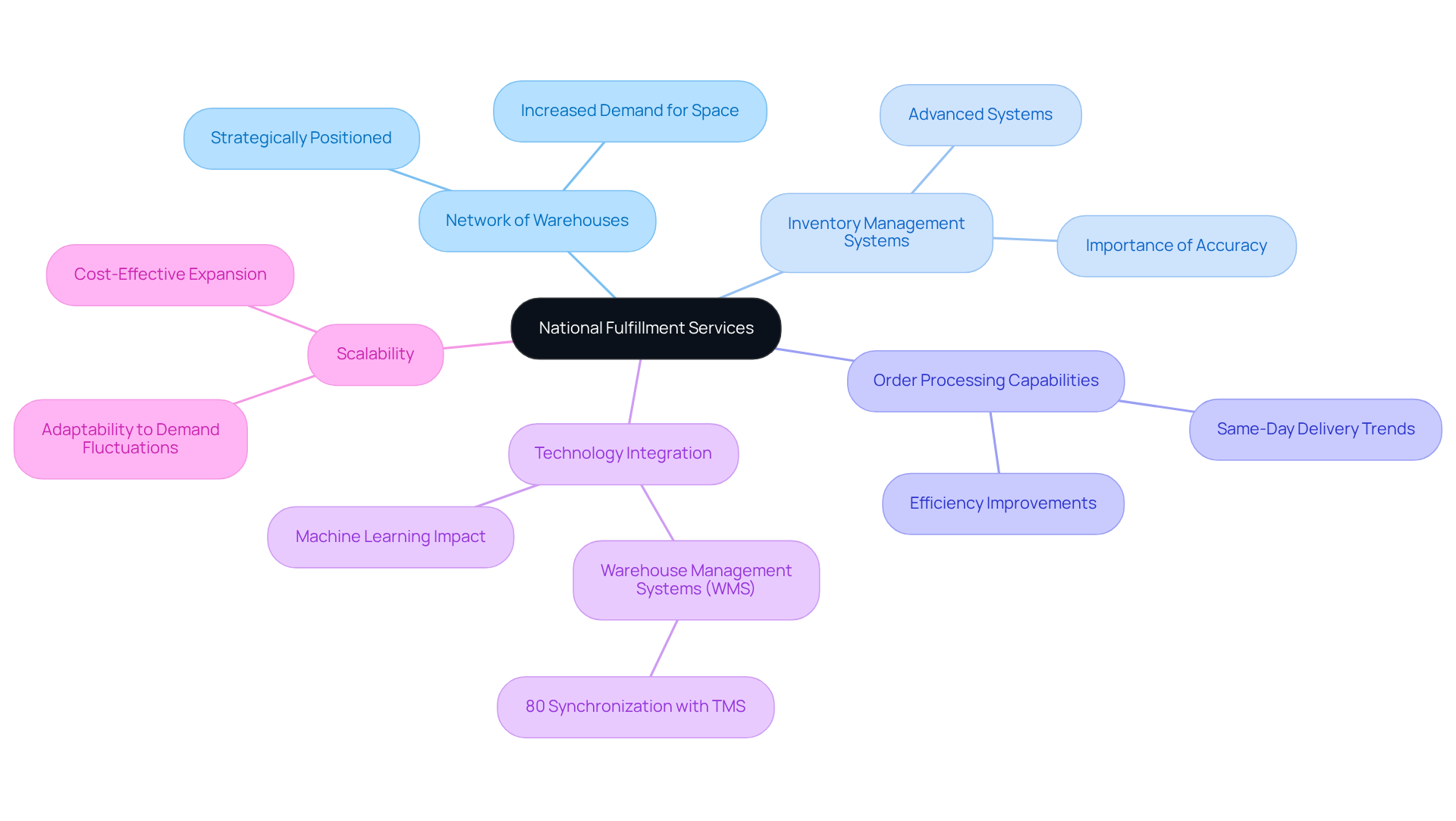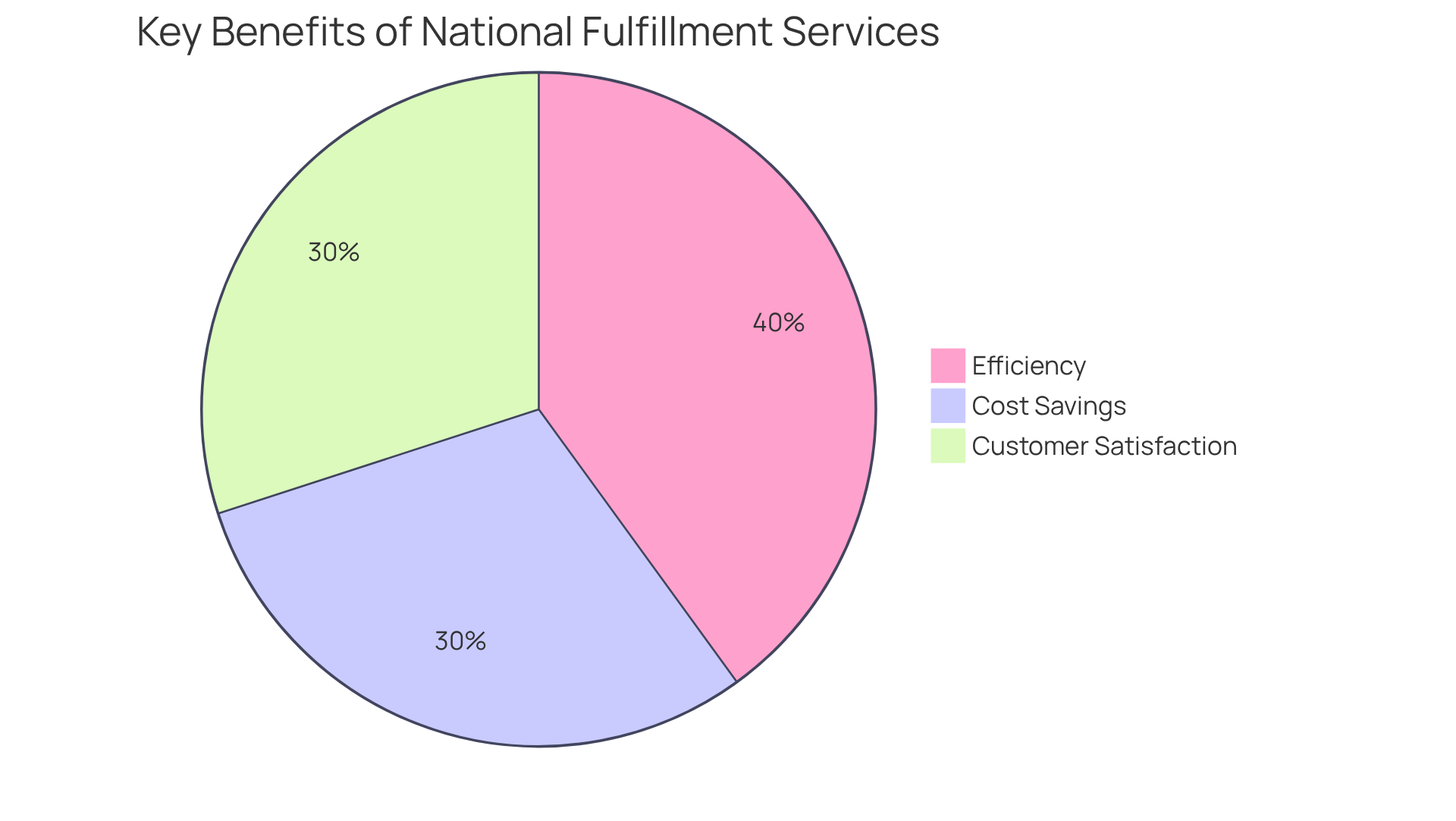Overview
National fulfillment services serve as comprehensive logistics solutions that expertly manage the storage, processing, and distribution of products. This capability significantly enhances supply chain efficiency and customer satisfaction. These services leverage advanced technologies and strategic warehousing to optimize operations, reduce shipping costs, and ensure timely delivery—crucial elements for businesses striving to remain competitive in the rapidly evolving e-commerce landscape. By embracing these innovative solutions, companies can not only streamline their operations but also elevate their service quality, ultimately driving customer loyalty and growth.
Introduction
National fulfillment services stand as a cornerstone of modern logistics, effectively integrating storage, processing, and distribution to meet the growing demands of consumers. By leveraging advanced technologies and strategic networks, these services not only enhance operational efficiency but also significantly elevate customer satisfaction through timely deliveries. As the e-commerce landscape continues to evolve, businesses must navigate the complexities of fulfillment to maintain a competitive edge and foster loyalty in an increasingly crowded marketplace.
How will you adapt your strategies to ensure reliability and excellence in your fulfillment operations?
Define National Fulfillment Services: Core Functions and Purpose
National fulfillment offerings represent a comprehensive suite of logistics solutions designed to manage the storage, processing, and distribution of products across vast geographical areas. These offerings include essential activities such as:
- Warehousing
- Order management
- Inventory control
- Shipping
These activities collectively enable businesses to effectively use national fulfillment services to fulfill client orders on a national scale. By integrating filling options—such as powders, gummies, and soft-gels—into , Western Packaging significantly enhances supply chain efficiency, ensuring a seamless transition from production to delivery.
The primary objective of national fulfillment services is to optimize the supply chain, drastically reduce shipping times, and elevate client satisfaction through timely product delivery. As the logistics landscape evolves, experts emphasize that efficient delivery solutions are crucial for meeting rising consumer demands and maintaining a competitive advantage. This strategic focus on fulfilling needs not only boosts operational performance but also fosters customer loyalty by guaranteeing that products reach consumers precisely when they need them.

Explore the Evolution of National Fulfillment Services: Historical Context and Market Relevance
The development of national service provisions is intricately linked to the rise of e-commerce, which began transforming the retail landscape in the late 20th century. Initially, fulfillment processes were largely manual, resulting in significant delays and inefficiencies. As consumer expectations shifted towards faster delivery times, companies recognized the imperative to innovate. This realization led to the adoption of advanced logistics technologies, such as:
- Automated warehousing systems
- Real-time inventory tracking
- Sophisticated order management software
Notably, the U.S. Census Bureau reports that e-commerce sales in the United States reached approximately $870 billion in 2021, showcasing a robust growth trajectory that demanded these innovations. These advancements have not only streamlined operations but have also enhanced accuracy and responsiveness in fulfilling client orders. Today, are essential for e-commerce activities, allowing companies to quickly adapt to market demands and uphold a competitive advantage. The global e-commerce delivery market is poised for substantial growth, driven by an increase in the implementation of logistics technologies that boost operational efficiency and customer satisfaction. Historical case studies reveal how companies like FedEx Fulfillment have adeptly navigated the challenges of a rapidly evolving marketplace by embracing these technologies, thereby solidifying their status as industry leaders. For instance, FedEx's commitment to reliability and speed has positioned it as a trusted partner for e-commerce businesses seeking to elevate their delivery operations.

Identify Key Characteristics of National Fulfillment Services: Operational Components and Business Benefits
National fulfillment solutions are characterized by a robust network of strategically positioned warehouses, sophisticated inventory management systems, and efficient order processing capabilities. These services harness technology—such as warehouse management systems (WMS) and transportation management systems (TMS)—to boost operational efficiency. Notably, 80% of warehouse operators are planning to synchronize their WMS with yard and transport management systems, underscoring a trend towards .
Furthermore, 80% of 1,400 IT and Operational Decision-Makers concur that new technology is essential to meet e-commerce demands over the next five years. Scalability emerges as another critical attribute, enabling companies to adjust their logistics capabilities in response to demand fluctuations. This adaptability is vital for businesses seeking to expand their market reach without incurring prohibitive costs.
Additionally, the surge in e-commerce has escalated the need for advanced inventory management systems, which are crucial for maintaining accuracy and improving delivery processes. The growing demand for warehouse space, driven by e-commerce expansion, further highlights the significance of these systems.
As the warehouse automation sector is projected to experience substantial growth, the adoption of these technologies will continue to shape national fulfillment services, ensuring that companies can effectively meet customer expectations. As Dave Waters aptly states, 'Machine Learning will revolutionize supply chain automation,' emphasizing the pivotal role of technology in this evolving sector.

Highlight Benefits of National Fulfillment Services: Efficiency, Cost Savings, and Customer Satisfaction
National delivery solutions offer a multitude of significant advantages that can transform operational procedures. Primarily, they enhance operational efficiency by streamlining order processing, resulting in reduced lead times and fewer errors. For instance, companies that implement these solutions can optimize shipping routes, which leads to decreased transportation costs and improved delivery times. Statistics indicate that businesses utilizing national delivery options can save up to 30% on shipping expenses—an essential factor for maintaining competitive pricing. Furthermore, national service providers can lower shipping costs by strategically distributing inventory across various warehouse locations, thereby further enhancing operational efficiency.
Moreover, the labor costs associated with in-house execution can be considerable. By outsourcing these operations, businesses can reallocate resources towards core activities, ultimately boosting productivity. Notably, 60% of online merchants partially delegate their logistical tasks, reflecting a growing trend towards efficiency, while 37% of ecommerce firms completely outsource their operational processes.
Customer satisfaction emerges as another critical advantage of national fulfillment services. are vital for retaining clientele in a competitive landscape. Companies that adopt these services often report higher sales and increased client loyalty, with metrics showing that swift and complimentary shipping options can elevate conversion rates by as much as 50%. In summary, the integration of national fulfillment services streamlines logistics and significantly contributes to cost savings and enhanced customer experiences, while the ecommerce fulfillment market is projected to expand at an annual rate of 14.2% through 2030.

Conclusion
National fulfillment services are integral to modern logistics, providing a comprehensive suite of solutions that streamline the storage, processing, and distribution of products nationwide. By optimizing supply chains, these services enhance operational efficiency and ensure timely deliveries, significantly boosting customer satisfaction.
This article has explored key aspects of national fulfillment services, including essential functions such as warehousing, order management, and inventory control. The evolution of these services, propelled by the growth of e-commerce, underscores the necessity for advanced technologies and integrated logistics solutions that improve accuracy and responsiveness. Moreover, the advantages of adopting national fulfillment services—such as cost savings, enhanced operational efficiency, and increased customer loyalty—highlight their critical role in today’s competitive marketplace.
Embracing national fulfillment services is vital for businesses seeking to excel in a rapidly changing environment. As consumer demands escalate, leveraging these services can result in significant operational enhancements and a stronger market presence. Companies are urged to explore the potential of national fulfillment solutions to not only meet but surpass customer expectations, ensuring sustained growth and success in the future.
Frequently Asked Questions
What are national fulfillment services?
National fulfillment services are a comprehensive suite of logistics solutions that manage the storage, processing, and distribution of products across large geographical areas.
What core functions do national fulfillment services include?
The core functions of national fulfillment services include warehousing, order management, inventory control, and shipping.
How do national fulfillment services enhance supply chain efficiency?
National fulfillment services enhance supply chain efficiency by integrating various filling options, such as powders, gummies, and soft-gels, ensuring a seamless transition from production to delivery.
What is the primary objective of national fulfillment services?
The primary objective of national fulfillment services is to optimize the supply chain, reduce shipping times, and improve client satisfaction through timely product delivery.
Why are efficient delivery solutions important in logistics?
Efficient delivery solutions are important because they help meet rising consumer demands and maintain a competitive advantage in the evolving logistics landscape.
How do national fulfillment services impact customer loyalty?
By ensuring that products reach consumers precisely when they need them, national fulfillment services boost operational performance and foster customer loyalty.




